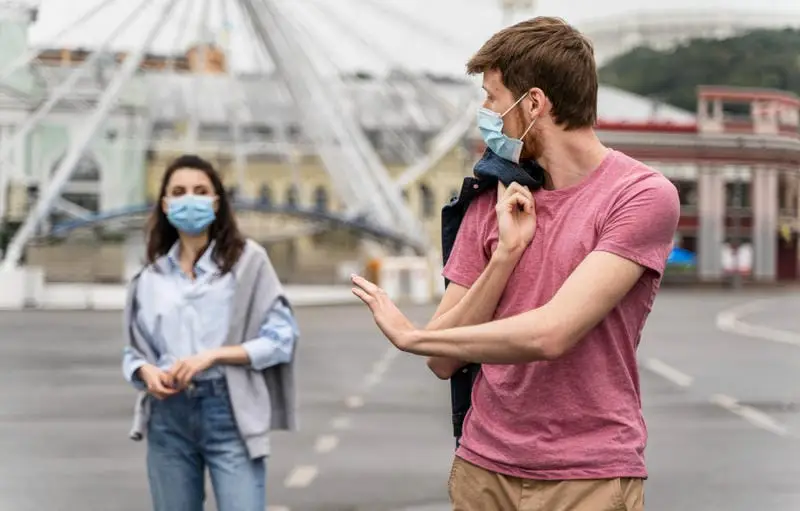- Published on: May 22, 2021
- 3 minute read
- By: Dr Rajan Choudhary
COVID Associated Black Fungus: Succumbing To Black Fungus !
COVID associated Black Fungus: What you need to know
As COVID spreads across India, there has been an increase in reports of associated infection with a black fungus occurring in some patients. It affects the nose, mouth, eyes, and lungs, and can be fatal. This is an infection we need to be educated on, and early recognition of it can be life-saving. Today we will talk about Mucormycosis, the black fungus responsible for these infections, and what you should do to prevent or recognize an infection.
If you want to learn how to recognize the infection, go down to the INFECTION section of the article.
FUNGUS
When our body gets infected by a bacteria or virus, the signs and symptoms are often recognized early because bacteria and viruses are aggressive, with toxins and mechanisms designed to cause harm to our body and cause easily recognizable symptoms. Fungi on the other hand are slow-growing, and usually, our bodies can fight usually fight these infections before they become a problem. We breathe in fungal spores all the time, especially when outside, in the garden, or in fields, and they cause no harm.
Mucormycosis, the responsible fungus, is found in soil, and decaying fruits and vegetables. It can enter our body by inhalation, by eating foods infected with it, or by direct contact with an open wound, thereby entering our blood. It can be found inside the nose of healthy people, causing no problems or disease. Before the COVID pandemic, infection by mucormycosis was up to 80 times more prevalent in India than in other developed countries, though still rare.
IMMUNOSUPPRESSION
Looking at case reports of patients infected with mucormycosis shows a common theme. Immunocompromised patients are at much higher risk of infection by the fungus and are more likely to have severe disease. This includes patients with diabetes, poorly controlled diabetes, patients taking steroids, organ transplant patients (who are usually on immunosuppressive medications to prevent rejection), those with blood cancer (leukemia/lymphoma, reducing your blood immunity).
Diabetes (especially poorly controlled diabetes) is a major problem in these cases, as diabetes is fairly common in India, can lay unrecognized, and if not controlled or treated appropriately the rising blood sugar levels can damage your arteries, nerves, and significantly lower your immunity. Any infection in diabetic patients can be more difficult to treat and spread more quickly, and this is made worse by COVID-19.
COVID causes widespread inflammation throughout the body, especially the lungs, and the resulting damage causes difficulty breathing and death by respiratory failure. Steroids are currently our best way to treat COVID, by suppressing the body’s immune system and preventing lung damage. Unfortunately, this also allows mucormycosis spores inhaled by COVID patients to infect the now vulnerable, damaged airway, lungs, and sinuses, and start spreading. The body’s response to the infection is dampened by the steroids, and in those with diabetes, it is hindered further.
INFECTION
The black fungus usually spreads in the nose and sinuses of the skull, as it prefers a warm, humid environment. From here it can spread into the eyes and in rare cases the brain.
Recognize the symptoms of the fungus, and be very suspicious in patients with diabetes or those who have had high doses of steroids.
- Facial swelling on one side
- Nose or sinus congestion
- Pain in the sinuses, around the nose, and eyes
- Black mold growing around the nose or mouth
- Fever, headache
When it infects the lungs it can cause symptoms such as cough, shortness of breath, or chest pain. Unfortunately, this can be difficult to separate from symptoms of COVID infection.
If you suspect you or someone you know has these symptoms, and they have the risk factors of immunosuppression or diabetes, you should visit a doctor early. Mucormycosis has a high mortality rate, and a delay in diagnosis by even a week can double it. Your doctor will take swab samples from your nose and look for signs of the fungus under a microscope. Blood tests and scans are also helpful in identifying the fungal infection.
TREATMENT AND PREVENTION
Treatment of mucormycosis requires IV antifungals such as Amphotericin B and may involve surgery to remove the infected areas and prevent further spread. This can include surgery in and around the nose, sinuses, and in rare cases even the eyes. This all depends on the extent of the fungal infection.
Prevention is key in these cases. Simple measures such as wearing a mask to reduce inhalation of spores can minimize infection, especially in the vulnerable, though it may not prevent it if they already had spores present in their nose and sinuses. Glucose tests to look for diabetes, and strict control of diabetes will improve your chances significantly. Keeping your blood sugar levels within the normal range is very important, so if you are diabetic now is the time to stick to your diabetic diet and medications.
Finally, we need to be careful when using immunosuppressive medications to treat COVID, and determining which patients should receive steroids (dexamethasone, prednisolone) and other drugs such as tocilizumab. If you are young and healthy, or you have a milder infection of COVID-19, it may be better for you to not take steroids early. Those with more serious COVID-19 infections may need steroids to survive, and in these cases frequent checks for mucormycosis infection is advisable.
The rise in this rare fungal disease in patients with COVID-19 presents a problem, as we do not have much literature to base our recommendations on, the disease is slow-growing and can be difficult to treat. But as always, understanding the disease process for black fungus and knowing its symptoms is important, as is informing your family and friends about this disease.









